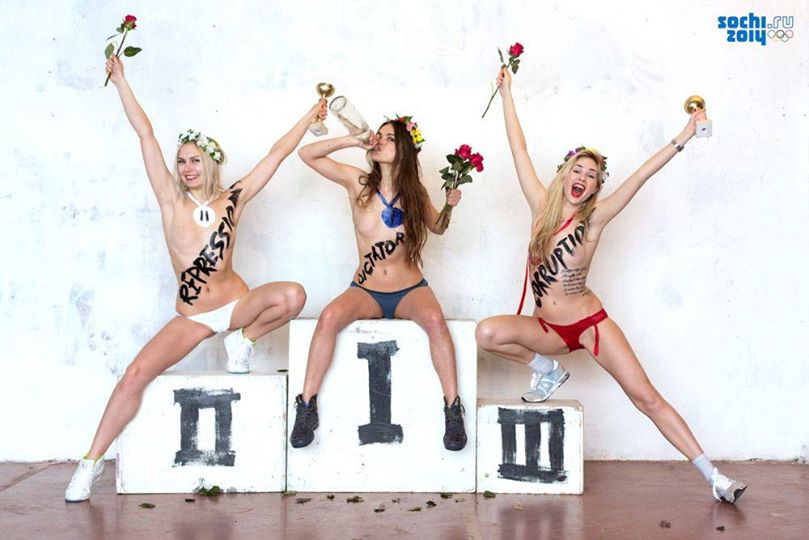The fireworks of the grand opening are still echoing on the mountains of Krasnaja Poliana and, at long last, sport is the main topic in Sochi. But, besides the terroristic threats, many critical aspects still remain: the Games are the most expensive ever, the pomp of the venues gives a distorted image of Russia, and the city is off limits to anybody willing to demonstrate against the Kremlin.

The Circassians
The Winter Olympics Games take place just a few hundred kilometers from the North Caucasus region, where rebels are fighting to install an Islamic state, and there have been concerns about security threats posed by an Islamic insurgency that has raged across the region.
The mountains of Krasnaya Polyana are now an pompous ski resort packed with tourists, athletes and Olympic officials. The place is also a favorite getaway for Vladimir Putin. But beneath the layer of snow and glittering venues, are buried the graves of the Circassians who died during the 19th century battle against the Czarist army. “We’re talking about holding the Olympics over a mass grave of Circassians,” said Muhammed Cherkesov, the leader of the Circassian minority in the North Caucasus. Circassians claim they have inhabited the region from prehistoric times. Over the centuries, they fought against the Huns, the Mongols and eventually the Russians. The latters, according to historians, uprooted them from their homeland and perpetrated an ethnic cleansing that killed some 1.5 million people.
In a video posted in July on YouTube, Dokku Umarov, the guerrilla leader who self-proclaimed emir of the Chechen separatist Islamic Caucasus Emirate in the southwest of the Russian Federation, said that Russians “plan to hold the Olympics on the bones of our ancestors, on the bones of many, many dead Muslims buried on our land by the Black Sea. We as mujahideen are required not to allow that, using any methods that Allah allows us”. Umarov also called on his mujahideen to use “maximum force to disrupt these satanic games”.
Sochi is under a virtual state of emergency: more than 30,000 policemen have been deployed in the city, army units patrol the area, and even six Pantsir-S air defense systems have been positioned in the region to protect the airspace. And a new counter-terrorism law has been issued to increase powers against terrorists.
The opposition and the expenses
Behind the banner of security and anti-terrorism, much has been done to compress and narrow freedom of speech. The control over journalists admitted to follow the Games is tightened, and even the right of demonstration has been moved 12 kilometers far from Sochi in a so-called “protest zone” that looks more like an Indian reservation.
In the effort of give a counter-information on the Games, Aleksey Navalny – the main figure of a weak opposition, who scored second in Moscow’s mayoral election last year – launched a website (sochi.fbk.info) with an interactive map of wastage of the Olympics, as a part of his project called “The anti-corruption foundation”.
Putin said that Russia had spent some $6.5 billion for the Games, but the estimated figure is much closer to some $ 50 billion. Navalny contradicted government statements that private companies had financed more than half of the investment in Sochi. “In their statements, officials referred to investments of Gazprom, Sberbank, Russian Railways and other government-affiliated entities as private investments”, the site reads, “but under international accounting standards they would be considered public investors”.
Embezzlement seems to have been the most popular sport in Sochi 2014 so far. “Athletes are not the only people who compete in Sochi,” Navalny wrote. “Officials and businessmen also took part in the games and turned them into a source of income”.
“The Games are nothing but a monstrous scam,” said Boris Nemtsov, a former deputy prime minister and now an opposition politician. “Putin needs these Games to prove how great he is, but his friends and the businessmen around him need the Olympics to improve their ratings in the Forbes magazine’s richest people in the world listings”.
In the meanwhile, a new world record has already been set, even before the Games had begun: the new road from Sochi’s coast to Krasnaya Polyana reached the total cost of $9.4 billion. With its 25 miles, and a cost of $200 million per kilometer, it is the world’s most expensive road. “They may as well have paved it in platinum or caviar and it would have been even cheaper”, Nemtsov said.
The fireworks of the grand opening are still echoing on the mountains of Krasnaja Poliana and, at long last, sport is the main topic in Sochi. But, besides the terroristic threats, many critical aspects still remain: the Games are the most expensive ever, the pomp of the venues gives a distorted image of Russia, and the city is off limits to anybody willing to demonstrate against the Kremlin.





